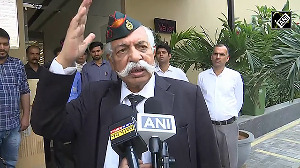It's Bollywood's new script for survival. So, what do recent hits like Shah Rukh Khan-Rani Mukherjee starrer Chalte Chalte and Ramgopal Verma's multistarrer Bhoot, have in common?
And what about Mahesh Manjrekar's Kaante and films under production like Khel, Darna Mana Hai and Samay?
They are all co-productions, the new formula for success in the film industry. Production houses, which earlier pumped money to produce, direct, market and distribute their films are now entering into matrimony with other production houses.
These are joint ventures of a different kind, as big and small films snuggle under a safe co-production banner.
Take Chalte Chalte, which has plucked Dreamz Unlimited from its deep slumber. The production house promoted by Shah Rukh Khan, actress Juhi Chawla and director Aziz Mirza, almost ended up on moviedom's scrapheap after its maiden production Phir Bhi Dil Hai Hindustani bombed two years ago.
Now Chalte Chalte, already in its third week, has grossed Rs 98 lakh (Rs 9.8 million) in its first week in Mumbai city alone (and Rs 1.4 crore or Rs 14 million in Delhi).
It's being hailed as one of the films that might revive Bollywood fortunes. It was co-produced with leading television producer Ronnie Screwvala's UTV.
Then, there's ace producer-director Ram Gopal Varma who has entered into a string of co-production agreements and is, as a result, turning out one movie after another.
His Company was co-produced with Narsimha Enterprises while the recent hit Bhoot was backed by Dream Merchants.
He's also doing four films with K Sera Sera productions, owned by Non-Resident Indians Raj Sital and Ash Pamnani. The first one, Darna Mana Hai, directed by Prabal Pandey, is due to be released on July 18.
Each of the films with K Sera Sera will be budgeted in the Rs 1 crore (Rs 10 million) to Rs 5 crore (Rs 50 million) range. The other films are Ab Tak Chappan, Murder in Shri Krishna Building and Inkaar.
All these three films are due for release in March 2004. "We plan to do six films with Varma Corporation every year," says Parag Sanghavi, CEO of K Sera Sera.
Later this year, Varma Corporation will release Ek Hasina Thi, a co-production with SRB Films and 20th Century Fox.
Then, there's UTV, which is also searching for partners as it gets more heavily into the movie business.
It has lined up six co-productions. These include the Amitabh Bachchan-Hrithik Roshan starrer Lakshya, co-produced and directed by Farhan Akhtar of Dil Chahta Hai fame and Ashutosh Gowarikar's Swades starring Shah Rukh Khan.
Says UTV CEO, Ronnie Screwvala, "Co-production helps in bringing together all the necessary strengths of the various parties. It is the way to go forward."
But what exactly is a co-production? "Co-production allows producers to merge resources and creative and talented people regardless of culture. The major reason for the emergence of co-productions lies in the benefits available through joint fund raising and sharing of risks," says Steve Norris, CEO, British Film Commission.
Until recently, the Rs 4,500 crore (Rs 45 billion) Indian film industry only got into co-productions with international companies or production.
These co-productions usually took place because they were needed for grants or to meet other criteria.
They were usually been the result of international co-production treaties existing between countries like Canada, UK, France, Australia, Ireland and Germany.
In these cases, filmmakers had to meet the guidelines on creative, technical and financial parameters, which need to be fulfilled to enable a production project to get a status of an official co-production. The official status gives production, financial and tax benefits in each of these countries.
Consider the recent Adoor Gopalakrishnan film Nizhalkkuthu or 'Shadow Kill' which had a serpentine co-producer list.
It included Artcam International, Paris, with the support of several French government agencies and ministries.
In addition, there was the Hubert Bals Fund of the International Film Festival Rotterdam, The Montecinemaverita Foundation and The Swiss Agency For Development and Cooperation. To cap it all, there was also the Swiss Federal Department of Foreign Affairs.
Or the Sudhir Mishra-directed Indo-French co-production Hazaaron Khwaishein Aisi. While the funding and the cameraman came from France, the rest of it was put together by an Indian crew.
Says Mishra, "I had my full creative freedom. And the best part of the whole thing was that my cameraman saw the film the way I did."
The biggest reason for signing co-production agreements is that they are a great way to share the risk and aim for higher budgets.
Says Sunir Khetarpal, Rabo India's head of media and entertainment, "It enables big production houses to not only hedge risks, but also go in for bigger and more elaborate productions."
Take, for instance, Mahesh Manjrekar's star-studded Kaante. Here, Pritish Nandy Communications, NRI Raju Patel and Sanjay Dutt-Sanjay Gupta's White Feather Films pooled in their resources.
While White Feather brought in the director, the script and one of the actors and helped execute the film with PNC, Raju Patel a Los Angeles resident organised the US shooting complete with technicians and locations. Manoevring all of this would have been a Herculean task for a single entity.
There are companies like SSKI Securities' iDreams which distributed runaway hits Mira Nair's Monsoon Wedding, Gurinder Chadha's Bend it like Beckham and Deepa Mehta's Bollywood Hollywood in India.
"Co-production makes sense only when an international partner is involved because the budgets are huge," says iDreams' CEO Ashish Bhatnagar.
He claims, his aim is to go in for partnerships with a possibility of distribution tie-ups to reach out and sell the product to other territories.
Some of its other releases include 16th December, Agnivarsha and Jajantaram Mamantaram. It is also working on with Samay.
Sunil Muthreja, CEO, Channel Nine Entertainment, says that co-productions help chase volumes.
"Apart from sharing risk, they enable even big production houses to take on more projects."
It produced the Dipti Naval-starrer Freaky Chakra with Trendz, the ad film production company started by adfilm maker V K Prakash.
Its next venture, Miss Maya, a murder mystery, is a co-production with overseas distribution company Madhur Entertainment.
The Rs 2 crore (Rs 20 million) budget is being split in the 70:30 ratio. "Profits and costs will be shared in the same ratio, " he adds.
His company was floated to produce films costing less than Rs 1 crore (Rs 10 million). He produced and distributed the Indo-American ventures Freaky Chakra and American Desi.
Now what happens when the lead actor is also a co-producer, like in the case of Amitabh Bachchan in AB Corp and Khan in Dreamz Unlimited?
The star's price tag is included in the financial investment. "Chalte Chalte has been an equal co-production, " says UTV's Screwvala.
Dreamz tackled the creative aspects while the financials, cash flow, marketing, worldwide distribution and pre-sales issues were jointly dealt with.
In fact, trade analyst Komal Nahata says that UTV killed two birds with its Dreamz tie-up. Not only was UTV able to fulfill its big screen ambitions repeatedly, it was able to sign up the biggest star. UTV is said to have paid Dreamz Rs 16 crore (Rs 160 million) for production alone.
Or look at 1857-the Uprising starring Aamir Khan. It is being co-financed by Bobby Bedi (who made Shekhar Kapur's Bandit Queen) and film processing guru Manmohan Shetty.
The British Film Council is offering post production and archival support for the film to be directed by Ketan Mehta.
What does all this mean for Bollywood? Better made films with bigger budgets and bigger star casts. With Kashmir out of bounds for film shootings, new foreign locales have become the staple for Indian cinema.
In keeping with the trend, even the conservative Rajshri banner which released its Hrithik Roshan, Kareena Kapoor and Abhishek Bachchan starrer Main Prem Ki Diwani Hoon on Friday, is believed to have lugged its star cast to lush locales overseas.
All this has, no doubt, impacted budgets which have ballooned. That's where co-productions make it accessible. K Sera Sera's Sanghavi says that co-productions lower costs by 20 per cent to 30 per cent.
"In Darna Mana Hai, we had accounted 10 per cent contingencies like extra day of shoot or extra props or any other mishaps. To our surprise, we actually completed the film a day before our schedule, thereby making the project more viable."
That's why companies today have no qualms about pulling their Bollywood dreams from the closet. They are all hitting the big screen with a vengeance.
Take the example of entertainment and leisure company Galaxy Entertainment, a venture between global financier George Soros-backed Chatterjee group and the Ruia group.
Besides running a string of entertainment centres and a trendy Mumbai lounge bar - Rain - Galaxy will be making its film debut with Khel, starring Sunny Deol, Suniel Shetty.and former Indian cricket captain Ajay Jadeja.
Even UTV was largely a television software company. Its moviemaking wing, UTV Motion Pictures was launched three years ago.
It made a debut in co-productions with the Manisha Koirala starrer Dil Ke Jharoke Mein and journalist-turned film maker Khalid Mohammed's Fiza featuring Karisma Kapoor, Hrithik Roshan and Jaya Bachchan.
It also co-produced Such a Long Journey, an Indo-Canadian venture, which won three awards at the Academy of Canadian Cinema and Television.
But the major beneficiaries of co-production are going to be smaller production companies and new aspirants.
Even corporates have moved into the limelight and these include well-known names of Indian industry like the Birlas, Tatas, Videocon and Pantaloon.
The A V Birla group-floated Applause Entertainment is making the Indo-British film Anita and Me, based on Meera Syal's book.
There is also talk that advertising agencies are moving into film production in a big way. And television channels have moved into this arena as a natural extension. Take the case of Zee's Gadar: Ek Prem Kahani with Sunny Deol and Amisha Patel.
Zee Network recently announced its first international venture with France TV and Silhouette Films to co-produce the $10 million One Dollar Curry.
It is being directed by Vijay Singh; whose earlier Jaya Ganga, another Indo-French film was a hit in Europe.
Nahata feels that all this will bring in large doses of transparency to Bollywood. "It would also imply that private financiers like Bharat Shah will take a backseat," he adds.
But there is a fear that co-productions would take their toll on a film's creativity. K Sera Sera's Sanghavi says his company's strength is to bring discipline and enforce time-based schedules on the sets, while creativity is taken care of by the creative man himself. Asserts Sudhir Misra, "I had my full creative freedom."
But he cautions there could be roadblocks ahead if the director has to handle two divergent egos. Ashutosh Gowariker who is making Swades for UTV says his alliance worked well as both the partners shared the same vision and were equally passionate about film making.
Such ventures have only just begun. The honeymoon period is still on. "But the capacity to handle risks together, should make co-productions worthwhile," says a film producer.







 © 2025
© 2025